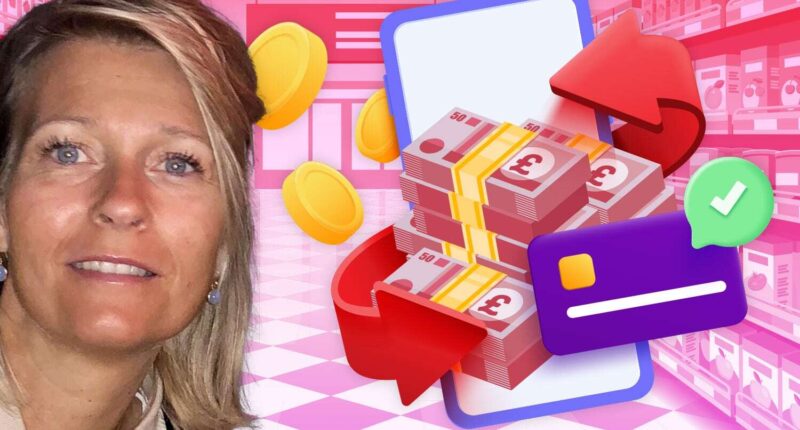MUM-of-two Sarah Marshall is set to knock three years off her mortgage by using a free app at the supermarket checkout.
The 48-year-old, who lives in Nottingham, is on track to become mortgage-free early by making extra payments.
Sarah, who works in HR, and her husband Will, 49, who is an IT contractor, usually pay an extra £125 a month, bringing their overall mortgage bill to around £1,700.
The couple overpays with the help of a free app called Sprive, which they have been using for just over a year.
The app links to their bank account and makes sure payments go directly to their lender, giving them an easy way to put extra cash towards overpaying their mortgage.
The amount they pay can change each month, depending on what they can afford.


In months where there is more surplus cash, the free app takes extra from their account.
And when money is a little tighter, Sprive leaves more.
The couple decided on the minimum and maximum monthly payments at the outset, and the app then works within those boundaries to take money each month.
Sarah said they started off by making small payments of £25, before upping this to an average of £125 and a maximum of £250.
Most read in Money
There’s also a feature on the app that means you can get cashback when shopping to put towards the mortgage.
Sarah does the weekly shop at Morrisons and estimates that this generates an extra £40 in cashback a month, which goes straight to overpaying her mortgage.
She spends roughly £200 a week on the grocery shop and earns £10 in cashback each time.
Sarah told The Sun that using the app’s cashback element alone has helped to shave five months off her mortgage.
She said: “Using the app when doing my shopping is just an absolute no-brainer.
“It’s so easy that it’s just become a regular part of my weekly shop.
“I think it’s a really good thing to be paying a little extra towards your mortgage in the background in such a flexible way.”
Sarah and Will took out a mortgage of around £350,000 with a 25-year term to buy their home just under five years ago.
The couple has so far paid more than £1,500 extra off their mortgage debt and could be mortgage-free by 2040.
They are also on track to save around £9,000 in interest.
Sarah said they hope that making the extra payments will mean they have more cash for their children Maya, 13, and James, 11, in years to come.
She said: “One day, my kids may decide they want to go to university and I’d love to be in the position to be able to help them through that financially.
“I’d recommend it to anyone because the app crunches the numbers for you and works out exactly what you can afford.”
Before you think about making extra payments, check with your lender if you can actually do this.
Some lenders might not let you make overpayments at all, so make sure you get all the information you need about whether you can set up a regular or one-off payment.
You should also be aware that you might be slapped with a fee if you overpay too much on your mortgage.
This is usually between 1% and 5% of the amount overpaid, according to MoneySavingExpert.
Sarah is able to track how much of her annual overpayment limit she’s used via the app, so she doesn’t breach her terms.
She is able to overpay by 10% of her outstanding loan per year without a financial penalty.
How does Sprive work?
Sprive shows users their current loan-to-value (LTV) and how close they are to the next threshold to help spur them on.
It also searches the market daily for new mortgage deals so users can see the best rates available for their circumstances.
The app will link borrowers up with a preferred broker if they decide to swap to help them through the process.
How much could it save you?
There are huge long-term benefits for homeowners who have enough spare cash to make regular overpayments.
For example, paying an extra £25 each month on a £250,000 mortgage fixed at a rate of 5% would save £23,986 over a 40-year term, according to calculations by Sprive.
In this scenario, a borrower would become mortgage-free two years and five months earlier.
Putting extra cash towards a mortgage also helps borrowers move into a lower LTV faster – which usually means lower rates when you are ready to fix into a new deal.
How overpaying your mortgage works
Most lenders allow customers on fixed rates to make overpayments of up to 10% of the outstanding mortgage balance in a year.
It’s important to not pay more than 10% because this can trigger hefty early repayment charges.
On a £100,000 mortgage over a 25-year term, paying an extra £90 a month would save over £4,800 of interest and see the loan repaid nearly three years early, according to calculations by Halifax.
And even smaller overpayments can still have a big impact.
For example, paying an extra £25 each month on a £250,000 mortgage fixed at a rate of 5% would save £23,986 over a 40-year term, according to Sprive.
Payments can also be ad-hoc, so if you find yourself with a lump sum or a little extra cash one month, you could consider putting it towards your loan.
Paying extra on your mortgage while you are locked into a low rate can be a great benefit when you next come to remortgage – especially if it helps you shift into a lower LTV bracket, which typically means lower loan costs.
You don’t need an app to overpay your mortgage and can simply pay directly to your lender.
However, a dedicated tool may help motivate you to make those extra payments.
Sprive shows users how close they are to meet the next LTV threshold, for example.
Earning cashback that goes directly to your mortgage is another way to chisel away the debt.
Sprive has partnered with brands including M&S, Primark, Cost and Uber so that spending through the app will automatically generate cash towards the mortgage.
The downside is that in some cases earning cashback through these sites may mean you are not able to earn loyalty points as usual with retailers.
With rising interest rates, it’s also worth comparing whether you could earn more interest by putting cash in a savings account and then use the proceeds to pay off your mortgage.
What are the risks?
With mortgage rates on the rise, many households have been left wondering if they should start overpaying to avoid future bill hikes.
If your mortgage rate is higher than your savings interest rates, then it could be worth considering overpaying on your mortgage.
For example, £10,000 in savings at 2% earns £200 for the year.
But if you use it to overpay a 3% mortgage, it reduces costs by £300 for the year.
Overpaying in certain cases pays off in the long term as it reduces what you owe and lowers the total interest you’ll pay.
For example, if a household on a £150,000 mortgage at 5% (25-year term) overpay £100 monthly – you’d reduce interest by £23,000 and repay four years and six months earlier.


But before you plough money into your mortgage, make sure you pay off more expensive debts, such as credit cards, and have enough money set aside to pay three to six months’ worth of essential bills.
Once you’ve used cash to overpay on the mortgage, you can’t get it back.
Do you have a money problem that needs sorting? Get in touch by emailing [email protected]










